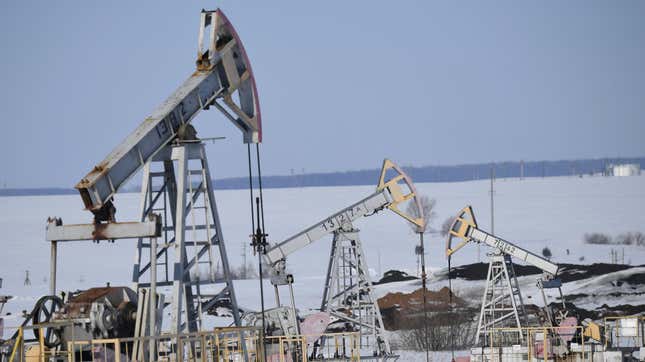
Major Western oil companies including Exxon, Shell and BP have paid billions of dollars to the Russian government as it escalated tensions against Ukraine in recent years, a new analysis released Friday from a group of NGOs finds, illustrating how the oil and gas industry has helped prop up and enrich President Vladimir Putin’s ongoing war against Ukraine.
The analysis, authored by Oil Change International, Global Witness, and Greenpeace, looks at industry payments in Russia beginning in 2014, when Russia began sending troops into Crimea, prompting widespread international outcry. Using data from Rystad Energy UCube, an industry database, the researchers were able to pull out payments made from upstream oil and gas projects in Russia by foreign companies, including American giant ExxonMobil and international majors BP, Shell, Equinor and TotalEnergies.
Many of the numbers in the report come from royalties and tax payments made by oil and gas companies to the Russian government as part of partner agreements with certain upstream projects in Russia . “For every barrel of oil that comes out of the ground, a certain royalty is paid,” said Lorne Stockman, a director at Oil Change International and one of the co-authors of the report. “Those are upstream royalties and taxes for extracting oil in Russia.”
A lot of these payments to specific governments aren’t reflected in companies’ annual reports or other public-facing documents, so public knowledge of how much oil and gas money is going to bad actor regimes is murky. But the data from Rystad shows that fossil fuel companies have provided some not-insignificant support to the Russian regime over the past seven years as it has progressed its aggressions against Ukraine. Shell, for instance, paid out $7.85 billion to Russia between 2014 and 2021, according to the data from Rystad pulled by the report’s authors. Meanwhile, Exxon paid $2.81 billion directly to Russia in the same time period.
“We’re trying to shine a spotlight into a rather opaque part of the industry to show just how crucial this industry is to the Russian government and how compliant Western companies have been in that process,” Stockman said. “We’re exposing a part that is not normally seen from just looking at the company’s annual report.”
A special case is BP, which has a relatively small amount of direct payments—just $800 million—but, the report says, can be held responsible for more than $77 billion of the $353 billion the Russian government is estimated to have taken from Rosneft between 2014 and 2021. This is due to BP’s 30-year history with Rosneft, Russia’s largest state-owned oil company (and one of the largest oil companies in the world).
“BP has by far the longest history and biggest investment in Russia of all these companies,” Stockman said.
A shift for BP came in 2013, just before the Crimean war, when it sold a company it had part ownership in to Rosneft in exchange for cash and a 20% share of the company. This deal, Stockman said, was “designed to keep some distance between Rosneft” and BP. As a result of the sale, BP claims that it is simply an investor in the company and receives a dividend from its 20% ownership. However, BP’s annual report also lists Rosneft’s reserves and production on a separate, but intertwined, balance sheet. Even though it may claim it’s just a normal investor, BP “benefits from the underlying financial health of Rosneft by including Rosneft’s financial metrics in its annual report,” Stockman said. (This arrangement is the same bit of tricky accounting that allowed BP to not count Rosneft’s emissions towards its net zero goals.)
BP said in a statement in response to the report that it’s not responsible for those billions of dollars that flowed from Rosneft to the Russian government. On a very technical level, that’s true, Stockman said—“money did not go from BP’s bank account to the Russian state.” But it’s a vast oversimplification of the influence BP has on the Russian oil industry, and by extension the support it has provided to the Russian government.
“When you own 20% of one of the world’s largest oil and gas companies, you’re not just an average shareholder,” Stockman said. “In the court of public opinion, most people would look at this and say, well, you’ve worked for the last 30-plus years to enable and support and profit from the Russian oil industry, more than any other company in the world, and there is responsibility.”
When the war started in late February, oil majors began to race for the door to cut relationships with Russia—including BP which, in a historic move, said it would totally cut ties with Rosneft and take its CEO off the board. But, Stockman said, there’s important lessons to be learned from how oil majors have propped up the Russian regime as they set their sights on fossil fuel supplies in other parts of the world.
“Companies are starting to look for resources from Africa and Latin America and other places to kind of replace what they have lost in Russia, and they could easily repeat some of the same mistakes,” Stockman said. “The industry has never shied away from working with authoritarian regimes and dictators, and there are plenty of those around the world today. Some of them are sitting on oil and gas resources that we really should be leaving in the ground. This research was not just to highlight what happened in the past but to also raise awareness for the future and say, don’t repeat this mistake.”